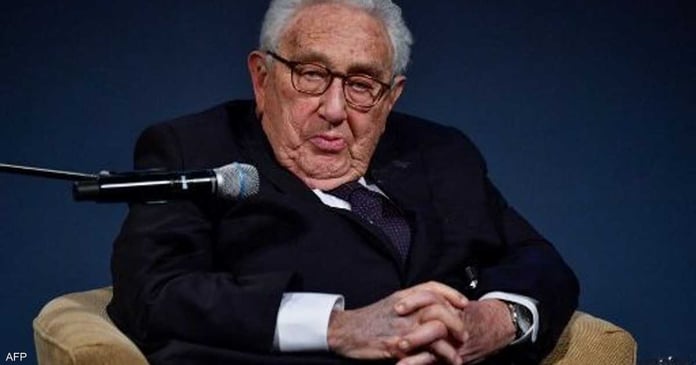Who is Kissinger?
Henry Alfred Kissinger served as the 56th Secretary of State of the United States from 1973 to 1977, during the period of the Sixth of October War, and he acted actively to become the most prominent actor on this issue. He first assumed the position of Assistant to the U.S. President for National Security Affairs in 1969, and continued until 1975. After leaving public service, he founded and ran Kissinger Associates, a consulting firm international. Kissinger was born in Fuerth, Germany on May 27, 1923, before being deported to the United States in 1938, and then granted American citizenship on June 19, 1943. He held numerous academic and official positions between 1954 and 1971, he was a member of the faculty at Harvard University, whether in the Department of Government or the Center for International Affairs, where he served as Associate Director of the Center from 1957 to 1960, and was director of nuclear weapons studies and foreign policy at the Council on Foreign Relations from 1955 to 1956. The veteran American politician wrote numerous books and articles on American foreign policy, international affairs, and diplomatic history. He was a pioneer in attempts at reconciliation between America on the one hand and Russia and China on the other, and he is the only surviving member of the Nixon government.
leading international role
Henry Kissinger played a major role in influencing American foreign policy on the world stage, as he was awarded the Nobel Peace Prize in 1973 for his role in trying to broker an end to the Vietnam War, and acquired world renown for his strong pragmatic influence in international diplomacy.
According to the US State Department, Kissinger, then Secretary of State, visited 213 foreign countries, traveled once to 17 countries in 18 days and spent 33 consecutive days in the Middle East in 1973, in negotiations between the Arabs and Israel.
But Kissinger’s political tactics, often implemented in secret, have not been without controversy: between the constant praise of his abilities and his diplomatic efforts, some criticize his positions and roles on certain issues, or as he is said to be a “warmonger”.
His strategy to mitigate growing hostilities with the Soviet Union culminated in the Strategic Arms Limitation Talks in 1969, the SALT Weapons Agreement, and the Anti-Ballistic Missile Treaty.
Kissinger also became involved with China in 1972, paving the way for Nixon’s pivotal visit and meeting with Chairman Mao Zedong, the first time a sitting American president had visited mainland China and was considered a a turning point in the Cold War.
Vietnam War
He held 68 meetings, some of which were secret, which eventually led to the Paris Peace Accords.
According to US State Department records, Kissinger was advising President Richard Nixon at the time to strike the border areas between Vietnam and Laos, and at that time he served as National Security Advisor, at one time where the number of casualties reached 600,000 civilians. in Cambodia and around 300,000 in Laos.
Kissinger and the Arabs
Kissinger led what became known as ‘shuttle diplomacy’ during the Arab-Israeli conflict, which contributed to the ‘disengagement’ between the Egyptian and Israeli armies and contributed to OPEC’s lifting of its oil embargo American.
In the final years of the 1973 war, the late Egyptian President Anwar Sadat’s phrase “my friend Kissinger” became famous for the consolidation of American diplomatic relations in the Middle East, which prompted the negotiation of an armistice. between Israel and the Arab countries in the aftermath of the war and the resumption of diplomacy between America and Egypt.
Martin Indyk, the former US Ambassador to Israel and President Bill Clinton’s Assistant Secretary of State for Near Eastern Affairs, in his book “Master of the Game, Henry Kissinger and the Art of Middle East Diplomacy”, explained the details of Kissinger’s strategy in the Middle East, explaining that Kissinger succeeded in gaining the confidence of the Arabs, which is what many foreign ministers who succeeded him lack and their handling of the structuring of the process of peace in the Middle East, reinforced by an active role for the United States.
Read the Latest World News Today on The Eastern Herald.


